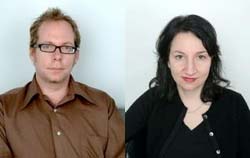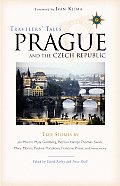David Farley and Jessie Sholl: A Passion for Prague
Travel Interviews: They met seven years ago in Prague. Now, they've edited a new Travelers' Tales Prague collection. Jim Benning asks the pair about the city's unique appeal.
03.06.06 | 1:02 AM ET

. The book, which went on sale last week, features travel stories by dozens of writers, including Jan Morris, Thomas Swick and Phil Cousineau. Farley contributed a story, as did Sholl, who wrote about the night the two met. This week, they’ll celebrate the book’s release in New York City with a party featuring a bottomless keg of Czechvar beer—“it’s hoppy and really smooth,” Farley says, and when it’s straight from the tap, he insists one sip takes him right back to Prague. I recently exchanged e-mails with the couple.
World Hum: What attracted you to Prague, David?
D.F.: I was way too comfortable in Santa Cruz and I wanted to throw myself into a place that was foreign enough to cause me a degree of discomfort and struggle (I think I was reading a lot of Buddhist philosophy back then). Of course, there are a gazillion places I could have gone to achieve this and, admittedly, Prague was also attractive because of the beer, long-legged beauties, and that the city’s huge historical center—with its labyrinth of winding cobblestone streets, the gothic Charles bridge, and a castle on the hill. The city somehow conformed to this (manufactured) idea of a fairy tale place in my mind.
You taught English there. What was that like?
D.F.: I really enjoyed teaching English. When you’re teaching a language, you have to get your students to talk, and the thing they’re usually most comfortable talking about is themselves. So I learned a great deal about Czech culture and history. And because I came there with this personal philosophy of eschewing the familiar, I had a lot of great experiences and, in the end, learned a lot about myself too. Three years later, when I realized I was living as comfortably as I ever had been, I knew it was time to move on and find something else to torment my soul. So I entered a graduate program in history in the Bay Area.
I’ve recently heard the Prague of the mid ‘90s spoken about in very reverent tones as if it were some kind of golden age, which I find kind of hilarious. When I was there at that time, some of the veteran expatriates had romanticized the Prague of the early ‘90s and were dismissive of everyone who moved there after them. But really, my experience there was a pivotal moment for who I am today. When asked what one should do to become a travel writer, South Florida Sun-Sentinel travel editor Tom Swick always says to move abroad for a while. I think he’s right.
You mention the reverent tones in which some people speak of Prague in the early- to mid-‘90s. To this day, every new hip place is referred to, if even half-jokingly, as “the new Prague.” What was it about Prague at that time that captured the imagination of so many?
D.F.: I think Prague has always exuded a spirit of openness and freedom. Two recent examples are The Prague Spring, in which Alexander Dubcek tried reforming the totalitarian aspects out of Communism, thus making it less restrictive and more open—and, of course, his (and the country’s) downfall was witnessed around the world in August 1968 when the Soviets lead an invasion of the country. More recently, playwright/philosopher Vaclav Havel’s rise to the presidency after the Velvet Revolution gave Prague an air of buzz, excitement and liberty. A lot of Americans heard stories about Havel hanging out with Lou Reed, Frank Zappa and the Rolling Stones, driving a golf cart around the Castle halls, and heading to the pub at night for a pint or two. We were attracted to Prague in the ‘90s because the city appeared to be going through the same revolution in ideals that America did in the late ‘60s.
So when new cities are proclaimed “the new Prague” it’s a bit of a misnomer, usually associated with trendiness. I’m guilty of this, as well—I recently wrote an article, proclaiming Prague the “new Prague.” It was a bit tongue and cheek though. Also, as a joke, I was trying to proclaim the village of New Prague, Minnesota the “new Prague.” They didn’t dig the idea much.
 Jessie, you teach fiction writing. Do you think you brought a different perspective to the material than a nonfiction writer/editor such as David?
Jessie, you teach fiction writing. Do you think you brought a different perspective to the material than a nonfiction writer/editor such as David?
J.S.: This is a good question. I’ve always thought of myself as a fiction writer and not a travel writer, even though I’ve written travel pieces before. And I did think going into the project that perhaps our editing styles would be different, or that perhaps I’d be looking more at what makes a good “story” versus what makes a good personal memoir piece—which is what they are, experiential tales—but that wasn’t the case. We both wanted interesting, well-written narratives that broadly encompassed the Czech Republic, including its history, people, the endless number of adventures it’s possible to have there, the absolutely stunning and amazing place it is. So in the end, our perspectives were the same. Good writing is good writing, a good story is a good story.
So editing a book with David didn’t turn out to be difficult?
J.S.: Working together wasn’t difficult at all. It was an incredible experience, actually. We had the same vision of the book, so going into it that way helped. We almost always agreed on which stories were high enough caliber writing-wise, and also whether each would fit into the range of dramatic action we were looking for. If I didn’t agree with a story Farley wanted to use, he’d argue his case, and vice-versa. There were no major disagreements though; the choices were pretty obvious.
It was the same way with editing: One of us would make the edits on a piece and show the other for approval, or sometimes we’d actually go through it together. In some cases one of us would work closely with a writer, giving feedback and suggesting changes—some stories went through four or five drafts before the writing shined and the piece was perfect.
David, do any stories in the collection stand out in your mind?
D.F.: This sounds like such a cop-out answer, but we’re quite pleased with all the stories. We were fortunate enough to get very high caliber submissions, which made our job a bit easier. Also, I was really surprised how many well-known writers were happy to write a story for us, despite the not-so-fabulous financial pay off they’d get. Writers like Mary Morris, Aaron Hamburger, Stephanie Elizondo Griest, Patricia Hampl, Thomas Swick, Helen Epstein and Paulina Porizkova all wrote original pieces for us.
But one essay I’d like to mention is Ivan Klima’s foreword. Finding someone famous to write the foreword seemed like a daunting task at first, but my friend Richard Katrovas (who knows just about every writer connected to Prague and is the director of the Prague Summer Program) put me in touch with Klima and he agreed to write the foreword. When I was in Prague last June I had coffee with Klima at his place, which was really exciting.
Also, my wife’s essay about the night we met in Prague is a personal stand out for me. In a way, that story is the first glimmer in the eye of this book.
That was a great story. Jessie, was that an easy story to write? I can imagine it being challenging, perhaps, to write about your spouse.
J.S.: Thanks for the compliment. The first draft of the story was difficult; it was about 20 pages of rambling with no narrative arc. Then I got lucky, because Farley went out of town on assignment (a lot of people say marriage to a travel writer is difficult—for obvious reasons—but for us the time apart is a strength: when Farley travels I camp out in the living room with my laptop, tell my friends I’m sequestered, leave only to walk the dog and teach my classes, and get a hundred times more writing done than when we’re both home in our minuscule Manhattan apartment). I wrote the second and third drafts during that week, in a sort of daze; I literally forgot that anyone would ever read it, which might be why it’s so personal. Oops, in a way, but not really. I’m proud of that story.
Thanks very much.![]()